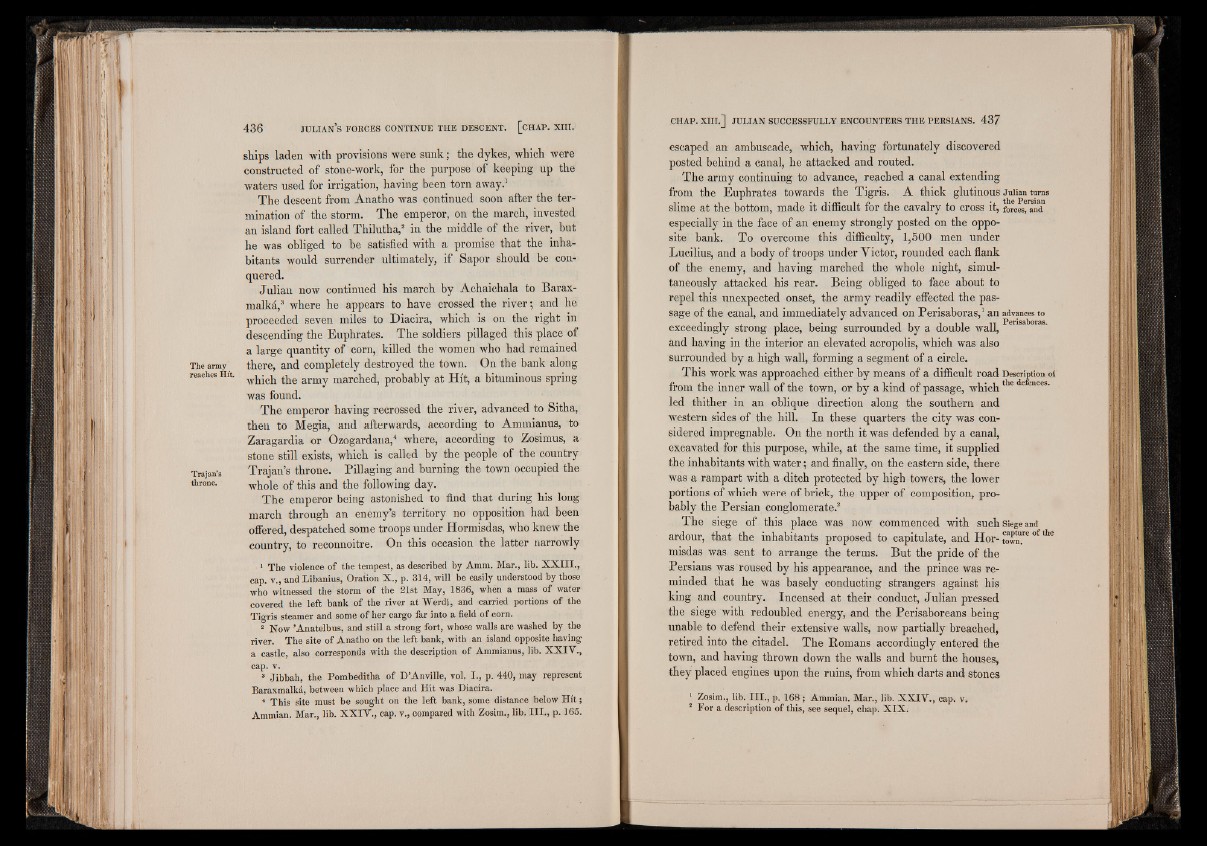
ships laden with provisions were sunk; the dykes, which were
constructed of stone-work, for the purpose of keeping up the
waters used for irrigation, having been torn away.1
The descent from Anatho was continued soon after the termination
of the storm. The emperor, on the march, invested
an island fort called Thilutha,2 in the middle of the river, but
he was obliged to be satisfied with a promise that the inhabitants
would surrender ultimately, if Sapor should be conquered.
Julian now continued his march by Achaichala to Barax-
malka,3 where he appears to have crossed the river; and he
proceeded seven miles to Diacira, which is on the right in
descending the Euphrates. The soldiers pillaged this place of
a large quantity of corn, killed the women who had remained
The army _ there, and completely destroyed the town. On the bank along
reaches Hit. tpe army marched, probably at Hit, a bituminous spring
was found.
The emperor having recrossed the river, advanced to Sitha,
then to Megia, and afterwards, according to Ammianus, to
Zaragardia or Ozogardana,4 where, according to Zosimus, a
stone still exists, which is called by the people of the country
Trajan’s Trajan’s throne. Pillaging and burning the town occupied the
throne. whole of this and the following day.
The emperor being astonished to find that during his long
march through an enemy’s territory no opposition had been
offered, despatched some troops under Hormisdas, who knew the
country, to reconnoitre. On this occasion the latter narrowly
1 The violence of the tempest, as described by Amm. Mar., lib. X X I I I .,
cap. v., and Libanius, Oration X ., p. 314, will be easily understood by those
who witnessed the storm o f the 21st May, 1836, when a mass of water
covered the left bank of the river at Werdi, and carried portions of the
Tigris steamer and some of her cargo far into a field of corn.
s Now ’Anatelbus, and still a strong fort, whose walls are washed by the
river. The site of Anatho on the left bank, with an island opposite having
a castle, also corresponds with the description of Ammianus, lib. X X IV .,
cap. v.
* Jibbah, the Pombeditha of D ’Anville, vol, I ., p. 440, may represent
Baraxmalka, between which place and Hit was Diacira.
* This site must be sought on the left bank, some distance below H i t ;
Ammian. Mar., lib. X X IV ., cap. v., compared with Zosim., lib. I I I ., p. 165.
!
escaped an ambuscade, which, having fortunately discovered
posted behind a canal, he attacked and routed.
The army continuing to advance, reached a canal extending
from the Euphrates towards the Tigris. A thick glutinous Julian turns
slime at the bottom, made it difficult for the cavalry to cross it, forCes, and
especially in the face of an enemy strongly posted on the opposite
bank. To overcome this difficulty, 1,500 men under
Lucilius, and a body of troops under Victor, rounded each flank
of the enemy, and having marched the whole night, simultaneously
attacked his rear. Being obliged to face about to
repel this unexpected onset, the army readily effected the passage
of the canal, and immediately advanced on Perisaboras,1 an advances to
exceedingly strong place, being surrounded by a double wall,
and having in the interior an elevated acropolis, which was also
surrounded by a high wall, forming a segment of a circle.
This work was approached either by means of a difficult road Description oi
from the inner wall of the town, or by a kind of passage, whichthe fences-
led thither in an oblique direction along the southern and
western sides of the hill. In these quarters the city was considered
impregnable. On the north it was defended by a canal,
excavated for this purpose, while, at the same time, it supplied
the inhabitants with water; and finally, on the eastern side, there
was a rampart with a ditch protected by high towers, the lower
portions of which were of brick, the upper of composition, probably
the Persian conglomerate.2
The siege of this place was now commenced with such siege and
ardour, that the inhabitants proposed to capitulate, and Hor- town*™ °f *he
misdas was sent to arrange the terms. But the pride of the
Persians was roused by his appearance, and the prince was reminded
that he was basely conducting strangers against his
king and country. Incensed at their conduct, Julian pressed
the siege with redoubled energy, and the Perisaboreans being
unable to defend their extensive walls, now partially breached,
retired into the citadel. The Romans accordingly entered the
town, and having thrown down the walls and burnt the houses,
they placed engines upon the ruins, from which darts and stones
1 Zosim., lib. I I I ., p. 168; Ammian. Mar., lib. X X IV ., cap. v„
! For a description of this, see sequel, chap. X IX .